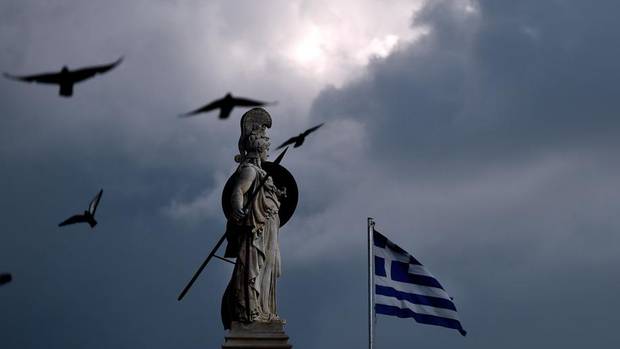By ERIC REGULY – EUROPEAN BUREAU CHIEF, The Globe and Mail
Ask any North American if Greece should be tossed out of the euro zone and invariably he or she will say Yes. Greece cannot pay its bills, refuses to reform its economy to make itself competitive, has turned tax evasion into a national sport and suffers from endemic corruption. So excise the cancer; the rest of the euro zone would be better off if Greece were to go.
Ask the same question of Europeans and most will say No – every effort should be made to keep Greece in the fold. At the risk of making a sweeping generalization, that’s because politics trumps economics in Europe. In North America, it is the reverse. The European Union and the euro zone within it were not launched by economic visionaries who dreamed of open markets and luring cheap Eastern European labour to enrich the shareholders of big companies. It was launched by visionaries who went through two of the deadliest wars in history and didn’t want to see their continent delivered to the meat grinder again.
The Italian political theorist Altiero Spinelli is considered the godfather of a federalist Europe. A communist, he was imprisoned by the fascist dictator Benito Mussolini and exiled to the island of Ventotene, just off Italy’s west coast. During the early part of the Second World War, he co-wrote the Manifesto for a Free and United Europe. Scribbled on cigarette papers that were smuggled off the island, the essay, known simply as the Ventotene Manifesto, would have enormous impact on the shape of postwar Europe. The manifesto argued that, assuming the defeat of Hitler and Mussolini, it would be folly to recreate Europe’s sovereign states as they were – eventually they would go to war again. The manifesto called for a “free and united Europe.”
In a second essay, called the United States of Europe, Mr. Spinelli called for centralized European institutions even if he thought that individual states should retain some autonomy. Remarkably, he said the new federal Europe should have “at its disposal a European armed service instead of national armies.” Only this week, European Commission President Jean-Claude Juncker called for the creation of an EU army as Russia taunts the West.
In fits and starts, the European project took shape. In 1957, the Treaty of Rome begat the European Economic Community. Various treaties since then have created supranational institutions, such as the European Parliament, free labour mobility, a common currency that is used today in 19 of the EU’s 28 countries and a bank, the European Central Bank (ECB), to prevent the common currency from disintegrating. Diplomats in Europe say the EU is the one region of the world where war is unthinkable.
Now the whole brave but flawed experiment in integration is under threat. The financial and debt crises of 2008 to 2013 triggered the bailout of four countries – Greece, Ireland, Portugal and Cyprus – and the backdoor sovereign bailout of Spain through the recapitalization of its banks. In 2012, the Greek banking system teetered on collapse.
If the whole European project were not shaky enough, Britain plans to hold a referendum on EU membership in 2017, assuming David Cameron’s Conservatives win the May 7 general election. And Greece is back on page one. Its potential exit, or Grexit, from the euro zone is said to be a clear and present danger.
Greece is circling the financial drain yet again. It is so desperate for money as debt repayment deadlines approach that it has raided the bank deposits of pensions and public-sector salaries and approached the Greek subsidiaries of multinational companies for loans. Unemployment is ticking up again and tax revenue is falling away.
The new radical left Greek government of Prime Minister Alexis Tsipras is in an apparent war with the country’s bailout masters – the EU, the ECB and the International Monetary Fund. The trio want Greece to stick with its debt repayment and austerity program. Mr. Tsipras and his Syriza government insist austerity is killing the economy. But the bailout sponsors have the upper hand – he who writes the cheques sets the rules.
The government is lashing out like a cornered animal. Greece is threatening to trigger a law that would enable it to seek up to €160-billion ($214-billion) in war reparations from Germany. This week, the relationship between Greece and Germany deteriorated to absurd levels when Greek Defence Minister Panos Kammenos threatened to pluck Islamist fundamentalists from the migrant population and ship them to Germany. Meanwhile, Greece has lodged an official complaint against German Finance Minister Wolfgang Schaeuble for having allegedly called his Greek counterpart, Yanis Varoufakis, “foolishly naive.” Mr. Schaeuble denied having made the remark.
Add it all up and it looks like Greece has finally had enough of the euro zone and vice versa. So is that it? Unlikely. While the chances of Grexit are rising, they are still small and ignore the reality on the ground. The EU is a political construct first, an economic construct second. To be sure, economic harmony would go a long way to keep the union sustainably intact, but it is not a necessary condition. Note that Greece’s Syriza government does not want to take Greece out of the euro zone even if it knows an exit is the only way to rid itself of the harsh austerity program and the massive debt load.
Were Mr. Spinelli alive today – he died in 1986 and the main European Parliament building is named after him – he would no doubt deplore the austerity inflicted on Greece and the euro zone’s other weaklings. But would he urge Greece to go? Doubtful, because unity at any cost is better than spectre of artillery lining the borders.









